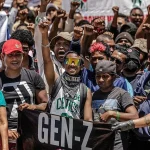By Kabiru Abdulrauf
When news broke of yet another U.S. government shutdown, anxiety rippled across Nigeria. For thousands of students preparing for fall admissions, business travelers eyeing crucial deals, and families planning long-awaited reunions, the fear was immediate: Would America’s budget drama shut the door on Nigerian travelers?
By midweek, the U.S. Embassy in Abuja moved to douse the tension. In a carefully worded notice, it assured that visa and passport services in Nigeria would continue, even as Washington ground into partial paralysis. “Scheduled passport and visa services… will continue during the lapse in appropriations as the situation permits,” the Embassy said.
Shutdown Politics, Nigerian Concerns
The shutdown triggered by a bitter standoff between Congress and President Donald Trump over healthcare spending marks the 22nd since 1976. It is not unfamiliar terrain for Americans, but its ripple effects abroad often spark disproportionate worry. In Nigeria, where U.S. visas are a gateway to education, healthcare, and global opportunity, even whispers of delays send alarm bells ringing.
This time, the Embassy was quick to act, clarifying that only its social media updates would be scaled back, not core consular functions. The reassurance came against the backdrop of rising visa applications from Nigeria, one of the top African countries sending students and professionals to the U.S. each year.
A Crisis With Layers
Behind the calm front, however, lies a complicated reality. Government shutdowns in the U.S. force non-essential federal workers into furlough up to 750,000 this time while essential services like the military, postal system, and welfare programs continue. Abroad, embassies often have to juggle limited funding streams, relying on service fees and contingency funds to keep operations alive.
For consular offices in Nigeria, where demand is consistently high, the priority is to avoid disruption. Student visas, business permits, and green card processing cannot afford delays without sending ripple effects through families and institutions back home.
Bigger Than Bureaucracy
For Nigerians, the episode is a reminder of how deeply tied their aspirations are to America’s political theatre. The shutdown may be thousands of miles away, but its echoes are felt in Lagos classrooms, Abuja boardrooms, and Benin homes preparing to send children overseas.
And yet, the Embassy’s assurance offers a sliver of stability. While Washington debates and federal workers face unpaid days, the wheels of U.S.-Nigeria mobility continue to turn. For now, Nigerians can breathe easy even if America cannot.








